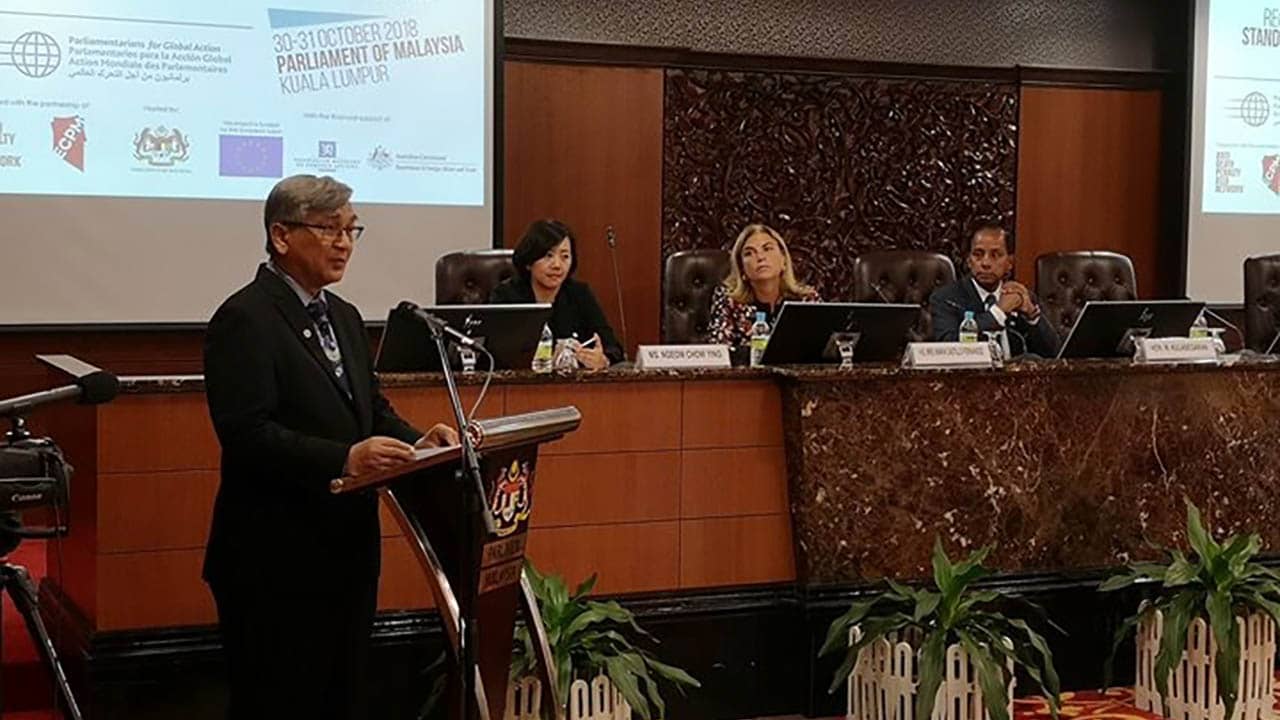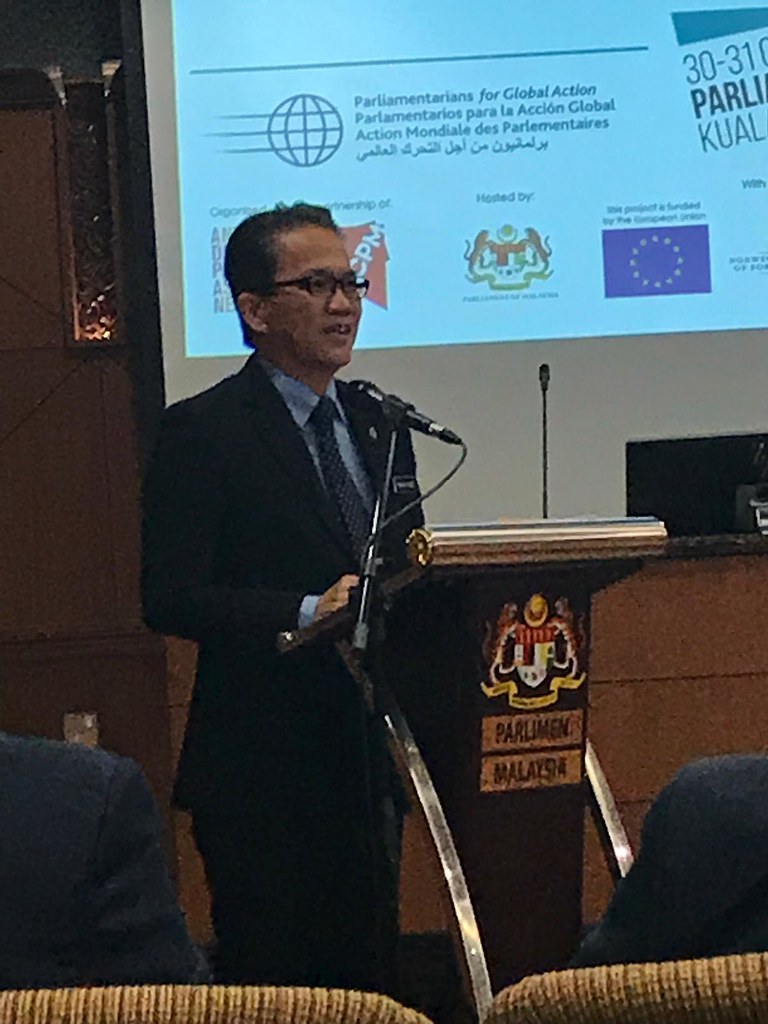
Kuala Lumpur | December 3rd, 2018
During 30th and 31st October 2018, Parliamentarians for Global Action (PGA), Ensemble contre la peine de mort (Together against the death penalty, ECPM) and the Anti-Death Penalty Asia Network (ADPAN) organised in Kuala Lumpur (Malaysia) a regional parliamentary seminar entitled “Standing Against Death Penalty in Asia”, with the support of the European Union and of the House of Representatives of Malaysia.
This meeting also provided follow up to the July 2017 Roundtable on the Abolition of the Death Penalty in Malaysia and in Asia, during which the then Minister of Law in the Prime Minister’s Department, Hon. Azalina Othman Said, had announced first the approval of a bill abolishing the mandatory death penalty for drug-related offences. Said bill was adopted later in 2017.
Under the leadership of Hon. Kula Segaran, Member of the Malaysian House of Representatives, Chairman of PGA’s National Group in Malaysia, Minister of Human Resources and Member of PGA’s Executive Committee, and of Hon. Kasthuri Patto, Member of the Malaysian House of Representatives and Secretary of PGA’s National Group, this event gathered parliamentarians from throughout South-East Asia to share their experiences and to discuss the future of the abolitionist movement in the region.
This regional seminar follows the declaration, on 10 October (World Day against the Death Penalty), by Minister of Law in the Prime Minister’s Department, Hon. Liew Vui Keong, that the Malaysian government would proceed with full abolition promptly. Both Minister Liew Vui Keong and Hon. Mohamad Ariff Md Yusof, Speaker of the House of Representatives, made a keynote address in the opening session of the regional seminar.
Even as the death penalty has been applied throughout the world and through the ages, murder still happens: it has not been deterred. Hon. Liew Vui Keong, Member of the House of Representatives of Malaysia, Minister of Law in the Prime Minister’s Department
Video Credit: Ensemble contre la peine de mort
Parliamentarians and civil society representatives from Australia, India, Pakistan, Papua New Guinea, the Philippines, Thailand, as well as Malaysia, attended the event and discussed a range of issues related to reducing the scope of capital punishment, ensuring decent conditions of detention for death row inmates, fighting threats of resurgence of the death penalty, and framing the abolitionist cause for the public opinion.
Ms. Shamini Darshni, Executive Director of Amnesty International Malaysia, introduced the arguments justified in the region to continue applying the death penalty. Through a case-study on Pakistan, Ms. Samana Malaika Raza, Policy and Advocacy Strategist for Justice Project Pakistan, further underline the inaccuracy of the alleged deterrent effect as a justification for relying capital punishment.
During a panel focusing on “reclaiming our values”, Mr. Abdul Rashid Ismail shared his experience as a lawyer about alternatives to death sentences and the framework applicable internationally and in Malaysia, followed by a presentation of Dato’ Dr. Ahmad Farouq Musa, Founder and Director of the Islamic Renaissance Front, about the place of capital punishment in Islam. Hon. Tomasito Villarin, Member of the House of Representatives of the Philippines and Member of the Committee on Human Rights, then shared with the participants the experience of the Philippines with the death penalty, including the recent efforts to block its resurgence.
In the framework of “opening new perspectives”, Hon. Dean Smith, Member of the Senate of Australia, and Hon. Chris Hayes, Member of the House of Representatives of Australia, both co-chairs of the parliamentary group against the death penalty, presented the commitment of Australia to opposing the death penalty, including through parliamentary diplomacy. Mr. Ivo Apostolov, Human Rights Focal Point at the Delegation of the European Union to Malaysia, followed with the efforts deployed by the European Union in that area, such as the initiative to ban the sale of goods used to practice torture or carry out executions. Mr. Phongtep Thepkanjana, Former Deputy Prime Minister and Former Minister of Justice of Thailand, shared the experience of Thailand.
Finally, in a session focused on the conditions of detention on death row, Ms. Suzana Norlihan shared her professional expertise as a Malaysian lawyer, including the specific needs of women on death row and also her personal experience as the sister of a death row inmate. Dato’ Mah Weng Kwai, Commisioner at Suhakam, then went on to describe the Human Rights Commission’s work to monitor and to improve the conditions of detention in Malaysia for death row inmates. Finally, Ms. Maitreyi Misra, Member of the Executive Steering Committee of Project 39A at National Law University Delhi, presented to the participants a case study about the impact of detention in India on the inmates’ dignity and the strategic litigation employed to improve the situation.
After the discussions, the participants discussed and adopted an Action Plan, calling on the parliamentarians of the region to mobilise their efforts against capital punishment. In accordance with the Action Plan, PGA members in Malaysia will support the Cabinet’s efforts to abolish the death penalty that are being led by Minister Liew Vui Keong.


